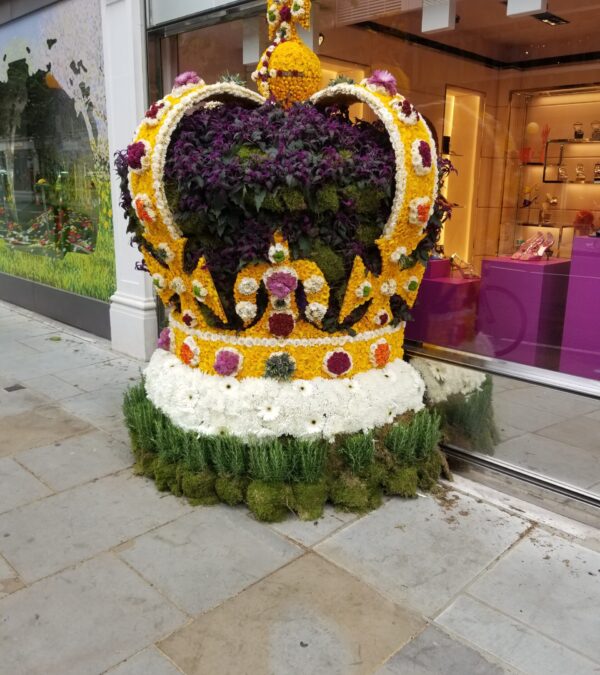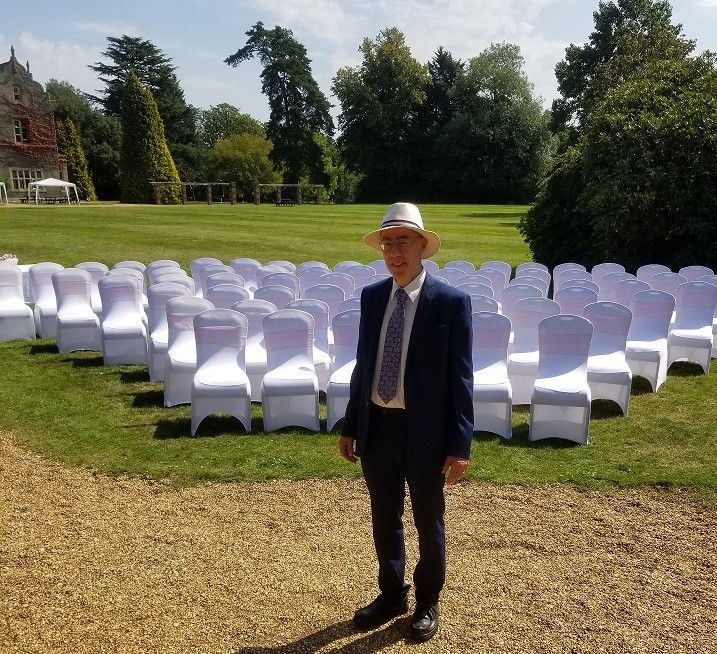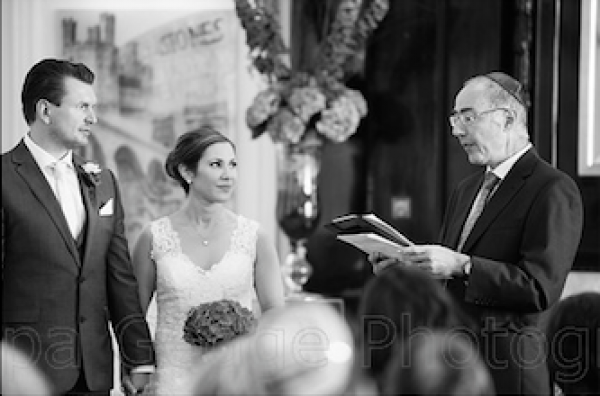
by Michael | Jun 7, 2022 | Blog
Returning to day-to-day affairs seems a little mundane, after the weekend we’ve just had! It’s been even harder for me, as I celebrated my birthday right in the middle of the long weekend. Anyway, I hope you enjoyed the Jubilee (and my birthday!).
A few weeks ago (I’m afraid I got distracted, and put it off!) The Daily Telegraph published an interesting article. Apparently, marriages in places of worship now (as of 2019) account for less than a fifth of all ceremonies. This is the first time such a drop has been recorded – and actually represents a record low.
Religious ceremonies accounted for 18.7% of opposite-sex marriages, and same-sex a mere 0.7%.
One reason suggested was that more couples are choosing to live together, rather than marry, but that doesn’t really explain the drop in the religious option. I wonder if it is more connected with the drop in active church-going.
Incidentally, I wonder if this will get worse before it recovers. Faced with all the uncertainty around Covid and social distancing, people prefer the greater flexibility of a civil celebrant to the rigidity of the Church.
I am not going to knock religious ceremonies (especially as I chose to marry in a full religious ceremony myself!). Obviously, they appeal to those religiously inclined, and can offer a personal, meaningful, spiritual and beautiful ceremony in a special setting.
Drawbacks could be perceived to be that they are rather one-size-fits-all. The basic liturgy is followed, and will be the same – or similar – for each couple. There is little flexibility in readings, texts, ritual etc., whereas a celebrant-led service can provide all these.
There can be complications, such as a mixed-marriage, which is no problem for a civil celebrant, but which may present difficulties for the priest. Moreover, a full-blown religious service can be a bit much for people who are only lukewarm towards religion, as it is.
The Church can be a lovely setting, but a civil venue can be chosen that is equally, or even more, spectacular and atmospheric.
So each to their own, of course. There is plenty to be said for religious weddings, but they are not everybody’s cup of tea. A personalised celebrant-led ceremony may well tick all the boxes.
To find out how, a chat with me may be all that you need!

by Michael | May 30, 2022 | Blog
As a wedding celebrant, “congratulations!” is very much part of my vocabulary. I was going to say “everyday vocabulary”, but there’s nothing everyday or mundane about a special occasion! Each one deserves to be celebrated to the full.
I know this is a little premature, but my usual blogging day is Tuesday and the following Tuesday would miss the Jubilee celebrations, However, I wouldn’t be the first to start early.
Obviously, I’m directing these particular congratulations to our monarch, Queen Elizabeth. I somehow doubt if she’ll be reading this (although I suspect she may be a secret subscriber!), but such an occasion cannot be ignored.
I’ve been in business as a celebrant for almost ten years; the Queen for 7 times as long. Even if she wasn’t still fulfilling a daunting workload in her nineties, the length of her service would be impressive. She may not have originally wanted to be queen, but she has certainly embraced the role and taken it seriously. She has totally devoted herself to it.
I don’t expect my business to go on as long as the Queen’s (perhaps I will double the present length of my service, if health allows), but I hope I can share her commitment and skills in some way.
I simply congratulate Her Majesty, and wish her continued good health so that she can continue to inspire others and to work on as long as she wishes to.
Congratulations, ma’am!

by Michael | May 24, 2022 | Blog
You may accuse me of cynicism, but I am convinced that some suppliers put their prices up as soon as they see an engaged couple on the horizon. They know it’s the couple’s first time (or likely to be), so they assume the pair aren’t very savvy in this area.
On the other hand, a lot of specialist knowledge, experience and ability is required, and they, deservedly come at a price.
Of course, what is “expensive” to one couple may be “reasonable” to another, so I am not going to put figures in this blog. I assume you will do your due diligence and compare suppliers in the various fields.
So what are you paying for?
Different suppliers may need different skills. Your photographer may come singly, or be inexperienced. In such a case, I’d look elsewhere, because the photographer has a lot to do and can’t afford slip-ups. Your caterer must surely be prepared to offer alternative menus (eg vegan or gluten-free). Your wedding planner will have to be available all day and absolutely know what they are doing and talking about.
As I’m a celebrant, I’m aware that a good one needs a lot of skills (some which are not commonly combined). These include being a good questioner-cum-listener, being a good writer and being a good presenter. Naturally, I have committed time and money to training and development, belong to professional associations that insist on high ethics and standards. Most of all, I have experience, as well as the personality that many find highly suitable for the job.
Consequently, I feel that I have a lot to offer my couples (and others too!) and it’s right that I should be remunerated for what I offer.
The same (or similar) applies to other suppliers. They may need other skills, but they are professionals. Many are experts in their field and can guarantee an excellent job.
So, although not all suppliers may be worth it, the vast majority are. Make sure you are clear on what you are expecting from them and read their Ts and Cs to ensure you understand what they will, and will not, offer.
Two mini-tips, if you want to save a bit of money: avoid extravagance (so don’t buy flowers out of season, for example) and think about the date of your wedding. It will cost more, if it’s on a special day like Valentine’s Day or New Year’s Day, and if you hold it in the morning, say, you should have some bargaining power.
Come what may, work out your budget first, speak to lots of suppliers and settle on the team you want to have around you. If that costs a bit more (and you can still afford it), then go with them.
Peace of mind will be (almost!) assured, then!

by Michael | Apr 25, 2022 | Blog
Just as there are many types of weddings, a mixed-faith service can vary ceremony by ceremony. Not just because the couples are different. Or because the religions highlighted might be different.
As with any celebrant-led ceremony, you can tailor the components to fit in with what you believe and want to include.
The ceremony can be 100% religious (or almost). I have conducted a couple of mixed-faith ceremonies, which were, to all intents and purposes, pretty much traditional Jewish wedding services (albeit with less Hebrew). In both cases, there was a Christian reading and/or prayer included. That’s how the couples wanted to play it out, and it worked.
In most cases, the couples want religious elements, despite not being active worshippers. In one case, it was simply to placate parents. Usually, it is because the couple, though not active participants, feel attached to their religion and want to include this as part of their important day.
There’s nothing to stop you mixing religious and pagan elements into one ceremony.
In all cases, the couples need to agree beforehand what they actually want. If they don’t, it’s a recipe for dis-harmony and potentially resentment. Of course, discussing things with the celebrant can clarify how things are going to appear on the day and make it easier to choose.
It may be that the couples want to clear things with their parents too. That’s fine, although you might be walking a tightrope here. Naturally, you want to please everybody (especially if your parents are helping to bankroll the event), but it is ultimately your day. You don’t want to get railroaded into doing what doesn’t sit comfortably with you.
One thing to bear in mind is how “heavy” you want the ceremony to be. For example, when I do a Jewish (or part-Jewish) wedding, I weigh up how much Hebrew should go in. You will need to decide on how many, and which, prayers you include. What sort of rituals will you put in? How about a few spiritual readings? Do you want a balance of religions, or is it OK, if things are a bit lop-sided?
Again, discussing this with your celebrant should illuminate things better for you. You could do worse than to have a word with me!
photo: Philippa Gedge

by Michael | Feb 22, 2022 | Blog
We’re human. We don’t always get along. Even on important occasions.
Preventing disagreements is preferable to resolving them. Obviously, that isn’t always possible, but it’s a great start to show openness and willingness to compromise.
As a wedding celebrant, I shouldn’t expect to see fractious behaviour at all – after all, people are supposed to be having the happiest day of their lives!
However, I have witnessed a few incidents – mostly, in the run-up to the wedding.
Cussedness
I was supposed to be conducting a mixed-faith wedding blessing. I had been found by the (Jewish) father, who was a divorcee; it had not been a happy separation. Whatever he opted for would be opposed by the wife out of principle. As he (and the couple) wanted me to officiate, she vetoed the proposal. Moreover, if they went ahead and used me, she would stop all her relatives attending! (By the way, I hadn’t even met her!)
Bridezilla
It was very difficult to witness the way the bride-to-be treated the groom when we had our rehearsals. On both occasions, the bride was incredibly tense. (It was to be a high society wedding, but still …!) Whatever the groom said (and he was extremely reasonable and placatory) sent her into fury. She screamed on occasion and yelled at him in front of the suppliers in a most humiliating fashion. I would have pulled out of the marriage, if I’d been him!
I confess, I was tempted to intervene, but was wise enough to hold my tongue and accept the situation. It was down to the groom to resolve things, and somehow they made it to marriage. On the wedding day, Bridezilla was the embodiment of sweetness and charm. A wonderful day was had by all!
Solutions
Going back to my introductory remarks, what do I mean by “openness” and “compromise”?
If there’s a problem of any kind, it pays to discuss it as soon as possible, however unpleasant a prospect that may be. If you let things go on as they are, the issue may deteriorate and then the whole thing will come out anyway.
Equally, if there’s a feeling of unfairness, then don’t let it fester. Better to bring it out into the open and try and resolve it early.
“Compromise” brings with it the idea of listening. Not just listening to your partner’s grievance(s), but understanding what has actually set them off. You may be “in the right”, but you shouldn’t dismiss your partner’s views or feelings. More likely, there’s a mixture of right and wrong, and you may be able to steer a middle path. But listening and being open-minded are paramount.
If the worst comes to the worst, find an intermediary (that you can agree on!).
A gung-ho attack is unlikely to do anything for your partner except to antagonise them. That’s hardly likely to serve either of you, is it?
Photo by Ayo Ogunseinde on Unsplash





